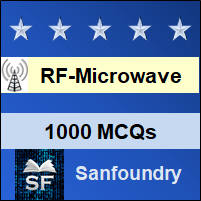
Microwave Engineering Multiple Choice Questions Highlights
- 1000+ Multiple Choice Questions & Answers (MCQs) in Microwave Engineering with a detailed explanation of every question.- These MCQs cover theoretical concepts, true-false(T/F) statements, fill-in-the-blanks and match the following style statements.
- These MCQs also cover numericals as well as diagram oriented MCQs.
- These MCQs are organized chapterwise and each Chapter is futher organized topicwise.
- Every MCQ set focuses on a specific topic of a given Chapter in Microwave Engineering Subject.
Who should Practice Microwave Engineering MCQs?
– Students who are preparing for college tests and exams such as mid-term tests and semester tests on Microwave Engineering.- Students who are preparing for Online/Offline Tests/Contests in Microwave Engineering.
– Students who wish to sharpen their knowledge of Microwave Engineering Subject.
- Anyone preparing for Aptitude test in Microwave Engineering.
- Anyone preparing for interviews (campus/off-campus interviews, walk-in interview and company interviews).
- Anyone preparing for entrance examinations and other competitive examinations.
- All - Experienced, Freshers and College / School Students.
Microwave Engineering Chapters
Here's the list of chapters on the "Microwave Engineering" subject covering 100+ topics. You can practice the MCQs chapter by chapter starting from the 1st chapter or you can jump to any chapter of your choice.- Transmission Line Theory
- Lines and Waveguides
- Microwave Network Analysis
- Impedance Matching and Tuning
- Microwave Resonators
- Power Dividers and Directional Couplers
- Theory and Design of Ferrimagnetic Components
- Noise and Non-linear Distortion
- Active RF and Microwave Devices
- Microwave Amplifier Design
- Oscillators and Mixers
- Introduction to Microwave Systems
- Antenna Basics/Family/Radiation
1. Transmission Line Theory
The section contains multiple choice questions and answers on circuit model of transmission line, lossless lines, field analysis, co-axial lines, terminated lossless transmission lines, smith chart, quarter wave transformer and lossy transmission lines.
2. Lines and Waveguides
The section contains questions and answers on parallel plate waveguide, rectangular and circular waveguides, co-axial lines, surface waves, striplines and micro-strip lines.
|
|
|
3. Microwave Network Analysis
The section contains MCQs on impedance, scattering and admittance matrices, transmission matrix and aperture coupling.
|
|
|
4. Impedance Matching and Tuning
The section contains multiple choice questions and answers on single and double stub matching, quarter wave transformer, impedance matching, reflections, tapered lines, binomial and chebyshev multi-selection matching transformers.
5. Microwave Resonators
The section contains questions and answers on series and parallel resonant circuits, rectangular and circular waveguide cavity resonators, dielectric and transmission line resonators.
|
|
|
6. Power Dividers and Directional Couplers
The section contains MCQs on properties of dividers and couplers, power dividers, wilkinson power dividers, quadrature and 180 degree hybrids, lange and other couplers.
7. Theory and Design of Ferrimagnetic Components
The section contains multiple choice questions and answers on ferrite isolators, ferrite phase shifters, ferrite circulators and properties of ferrimagnetic materials.
|
|
|
8. Noise and Non-linear Distortion
The section contains questions and answers on noise figures, noises in microwave circuits and non-linear distortions.
|
|
|
9. Active RF and Microwave Devices
The section contains MCQs on pin, gunn, impatt, baritt and varactor diodes, applications of rf diodes, field effect transistors, heterojunction bjt, microwave tubes, metal oxide semiconductors, hybrid and monolithic microwave integrated circuits.
10. Microwave Amplifier Design
The section contains multiple choice questions and answers on two port power grains, power amplifiers, stability circles, single stage and broadband transistor amplifier designs.
|
|
|
11. Oscillators and Mixers
The section contains questions and answers on rf oscillators, crystal and microwave oscillators, oscillator phase noise, dielectric resonator oscillators, frequency and transistor multipliers.
|
|
|
12. Introduction to Microwave Systems
The section contains MCQs on wireless communication, noise characteristics of receivers, radar and radiometer systems, antenna gains and its efficiency, digital modulation and bit error rate.
|
|
|
13. Antenna Basics/Family/Radiation
The section contains multiple choice questions and answers on antenna basics, family and radiations.
|
|
|
Wish you the best in your endeavor to learn and master Microwave Engineering!
